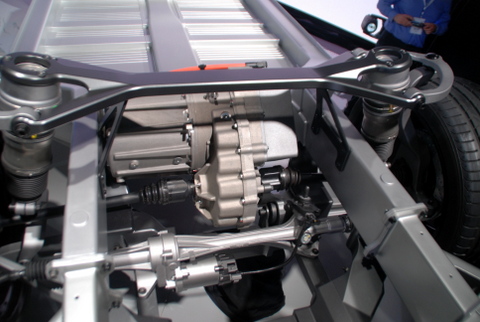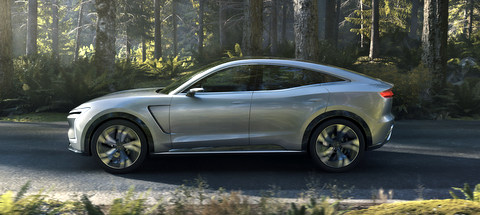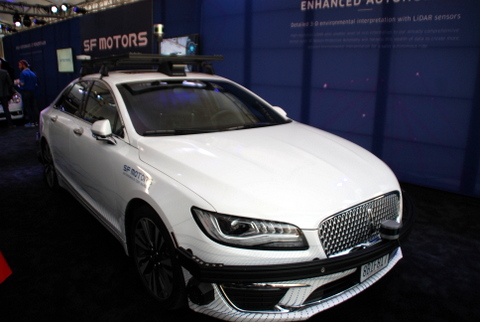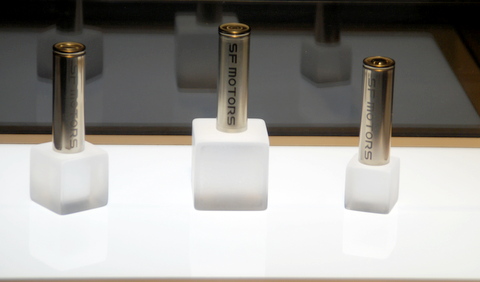Chinese-backed Start-up Unveils Crossover EVs; Touts Technology
Silicon Valley witnessed yet another automotive coming out party last week as SF Motors unveiled an upscale crossover electric vehicle and showed off some of the company’s technology. While the car itself may be a bit of a me-too (high-power, connected, autonomous-capable in a conventional SUV coupe-like shape), the back story of the technology this well-funded formerly stealth start-up has developed tells a much more interesting story.

The most intriguing part of the SF Motors is the vertically integrated nature of the company. It showed off a modular home-grown electric motor (in nominal 100, 200 and 400 kW trim), proprietary battery cells and packs, gearboxes and controllers. It also announced an intent, perhaps with a little hubris, to not only put its components in its own cars, but sell them to other automakers.
SF Motors is affiliated with Chongqing Sokon Industry Group, one of many privately held car companies in China. Chongqing Sokon provides financial backing and a plant in China capable of producing 150,000 cars annually. Currently the company produces a variety of models in China.
T0 bolster the company’s move into electric vehicles, SF Motors has set up its headquarters in Santa Clara, California, in Silicon Valley. The company has R&D centers in China, the U.S., Germany and Japan. It acquired the old AM General plant in Indiana as a U.S. production site. The nominal annual production capacity of that plant is 50,000 vehicles. It plans to launch its cars in the U.S. market first and then migrate to China and other markets.
The First Car
SF Motors showed off two of its expected three models to press and investors last week—the SF5 midsize crossover that it plans to have on the market in 2019 and the full-size SF7 crossover that will follow. Details were sketchy on the cars, which follow the styling trend being set by the BMW X4 and X6 and the Mercedes-Benz GLC and GLE SUV coupes.

The cars looked good as concept cars usually do (well, maybe Faraday Future’s FF91 is the exception that proves the rule). SF Motors plans to start taking orders for the SF5 later this year. Media reports put its price at about $60,000 while the SF7 may hit $95,000. Of course, getting the 1000-horsepower version that will do 0-60 in under three seconds could be a little more. And that kind of performance may keep you under the 300-mile range the company said the cars will be capable of.
The specs released last week by Dr. Yifan Tang, SF Motors’ CTO, were that the motors would deliver 5.5 kW and 10 Newton-meters of torque per kilogram of weight, which would put it in the top end of electric motors for that metric, Tang said the battery packs would delivery 280 kWh per kilogram.
Future Tech
Of course, it’s not just about automobiles in Silicon Valley so SF Motors also laid down some markers for its technology. By 2020 they will be introducing “protective autonomy with connectivity,” according to Tang. The company reported it is already testing systems with computer vision, deep neural networks and Lidar.

SF Motors will also be building on existing relationships with suppliers, including Bosch, Dürr, Siemens, Samsung SDI, Infineon Technologies, LGC and AFT. The company has also purchased Tesla co-founder Martin Eberhard’s battery start-up, and made Eberhard chief innovation officer of SF Motors.
In its technology display, the company also showed off its 21700 cells for a solid state cylindrical battery. The company also intends to get into the battery recycling business, creating energy storage products that would allow second use in homes and offices for batteries no longer functional for automotive use.

It’s an ambitious plan, but SF Motors believes it is well on its way toward becoming a producer of high-end and affordable electric cars and potentially an industry supplier. As is the case with other recent EV introductions, such as Lucid Motors and Faraday Future, the proof will be not only delivering the first or the 100,000th car to paying customers, but doing so at a profit. That’s something first-mover Tesla is still struggling with after 10 years. We’ll be keeping an eye on their progress.
Related Stories You Might Enjoy: EV Start=Ups
News: Fisker EMotion EV Introduced at CES
News: Byton Introduces Electric SUV
Flash Drive: Tesla Model 3 Long Range
Flash Drive: 2017 Chanje V8070
News: NY Start-Up Bollinger Motors Reveals EV Truck
News: First Tesla Model 3 Deliveries
News: Lucid Motors Introduces High-End EV

It all sounds credible, but there are some big mountains to climb, before opening even a small bottle of bubbles.